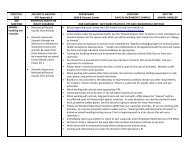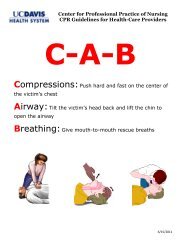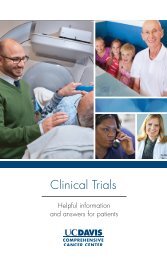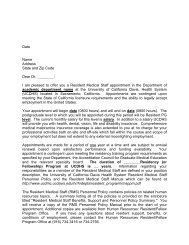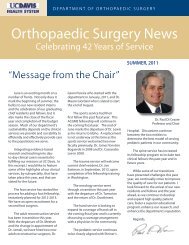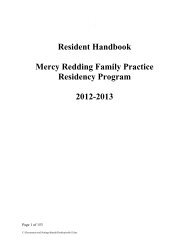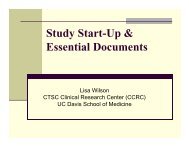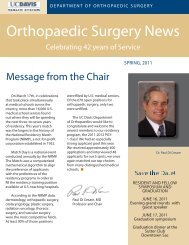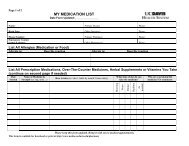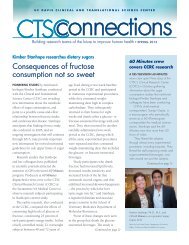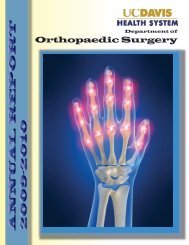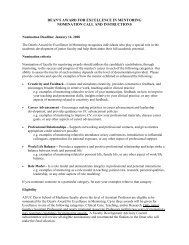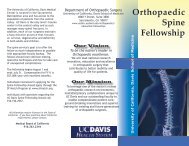Laurie A. Vismara, Ph.D. - UC Davis Health System
Laurie A. Vismara, Ph.D. - UC Davis Health System
Laurie A. Vismara, Ph.D. - UC Davis Health System
Create successful ePaper yourself
Turn your PDF publications into a flip-book with our unique Google optimized e-Paper software.
<strong>Laurie</strong> A. <strong>Vismara</strong>, <strong>Ph</strong>.D.<br />
<strong>Laurie</strong> A. <strong>Vismara</strong>, <strong>Ph</strong>.D., Assistant Professional Researcher, Department of Psychiatry and<br />
Behavioral Sciences, School of Medicine<br />
Education<br />
B.A., Psychology, University of San Diego, 2001<br />
M.A., Education, University of California, Santa Barbara, 2003<br />
<strong>Ph</strong>.D., Education, University of California, Santa Barbara, 2005<br />
Biography<br />
Dr. <strong>Laurie</strong> <strong>Vismara</strong> is an assistant research scientist in the Department of Psychiatry and<br />
Behavioral Sciences and a board certified behavior analyst. She specializes in conducting<br />
treatment research with young children at risk or diagnosed with autism spectrum disorder and<br />
their families. Her work has extended the Early Start Denver Model into a parent training<br />
curriculum for immediate provision of intervention following children’s diagnoses. More<br />
recently, Dr. <strong>Vismara</strong> has developed telehealth or interactive communication technology<br />
systems for families and early intervention providers to access and learn more about the Early<br />
Start Denver Model. Her research has examined the potential impact of telehealth for making<br />
early intervention and training more readily available and less expensive to families and<br />
providers without compromising the quality of care to be delivered to children. Her work has<br />
been published in several journals, including the Journal of Autism, Journal of Positive<br />
Behavior Intervention, Journal of Autism and Developmental Disabilities, and Topics in Early<br />
Childhood Special Education. She also reviews for periodicals such as the Journal of Early<br />
Intervention, Journal of Child Psychology and Child Psychiatry, and Journal of Speech,<br />
Language, and Hearing Research.<br />
Publications<br />
<strong>Vismara</strong>, L.A., Young, G.S., & Rogers, S.J. Community dissemination of the Early<br />
Start Denver Model: Implications for science and practice. Topics in Early Childhood<br />
Special Education. doi: 10.1177/0271121411409250. This study is the first dissemination<br />
article examining community implementation of the Early Start Denver Model, an<br />
evidence-based approach associated with accelerated developmental learning in young<br />
children with autism spectrum disorders.<br />
Dunlap, G., Carr, E.G., Horner, R.H., Koegel, R.L., Sailor, W., Clarke, S., Koegel, L.K., Albin,<br />
R.W., Vaughn, B.J., McLaughlin, D.M., James, K.M., Todd, A.W., Newton, J.S.,<br />
Lucyshyn, J., Griggs, P., Bohanon, H., Choi, J.H., <strong>Vismara</strong>, L.A., Boettcher, M.,<br />
Buschbacher, P., & Fox, L. A descriptive, multiyear examination of positive behavior<br />
support. Behavioral Disorders, 35, 259-279, 2010. This study is one of the first to<br />
provide a descriptive analysis of positive behavior support with diverse participants and<br />
broad measurement strategies over multiple years.<br />
<strong>Vismara</strong>, L.A., & Rogers, S.J. Behavioral treatment of autism: What do we know<br />
Annual Review of Clinical Psychology, 6,447-468, 2010. This review addresses autismspecific<br />
intervention models adopting applied behavior analysis principles, some of<br />
which were designed as comprehensive programs, aimed to address all developmental<br />
areas of need, whereas others were skills-based or directed toward a more<br />
circumscribed, specific set of goals.<br />
________________________________________________________________________The MIND Institute__________________<br />
1
<strong>Vismara</strong> LA, Young GS, Stahmer AC, Griffith EM, Rogers SJ. Dissemination of evidencebased<br />
practice: Can we train therapists from a distance Journal of Autism and Developmental<br />
Disorders, 39, 1636-1651, 2009. This paper demonstrates the effectiveness of training and<br />
coaching of therapists in a treatment model over distance using video conferencing technology.<br />
Both improvements in therapist implementation and in child behavior were demonstrated in the<br />
paper supporting the use of distance based training techniques.<br />
<strong>Vismara</strong> LA, Colombi C, Rogers SJ. Can one hour per week of therapy lead to lasting changes<br />
in young children with autism Autism, the International Journal of Research and Practice 13,<br />
93-115, 2009. This article documented the immediate social communicative gains in toddlers<br />
recently diagnosed with autism as the result of a short-term parent education intervention<br />
program. The results demonstrated parent mastery of therapeutic strategies after 5-6 hours of<br />
coaching. It is one of the first papers to document parent fidelity in such a short amount of time<br />
with child gains across multiple areas of development as reported from observational data as<br />
opposed to parent-report measures.<br />
<strong>Vismara</strong> LA, Rogers SJ. A new focus for parent education: Bridging the gap between<br />
diagnosis and intensive early intervention services. American Speech Language Hearing<br />
Association 15, 15-21, 2008. This paper reviewed the literature and findings from the above<br />
mentioned paper (i.e., <strong>Vismara</strong> et al., 2009). It reviewed in more detail the intervention’s<br />
philosophy and teaching practices and the rationale behind adopting a parent coaching<br />
approach to further child gains. Additional discussion focused on the type of support and<br />
length of parent coaching programs needed to enhance parent and child outcomes.<br />
Rogers SJ, <strong>Vismara</strong> LA. Empirically supported comprehensive treatments for early autism.<br />
Journal of Clinical Child and Adolescent Psychology 37, 8-38, 2008. This paper reviewed<br />
empirical studies of comprehensive treatments for young children with autism published since<br />
1998 in order to evaluate current research needs. Research findings were discussed in relation<br />
to practice guidelines for treatment and to unaddressed areas of research.<br />
<strong>Vismara</strong> LA, Rogers SJ. Treating autism in the first year of life: A case study of the Early Start<br />
Denver Model. Journal of Early Intervention, Innovative Practices Section 31, 91-108, 2008.<br />
This is one of the few studies to examine intervention outcomes from an infant determined to be<br />
at risk for autism at 9 months of age and later diagnosed at 18 months of age. Findings are<br />
discussed in relation to providing an intervention model that can equip parents with the<br />
necessary tools to engage, communicate with, and teach their young children with autism<br />
beginning immediately after the diagnosis.<br />
Presentations<br />
Autism intervention in the first year of life.Rogers, S.J., <strong>Vismara</strong>, L.A., & Wagner, A.,<br />
poster presented at the International Meeting for Autism Research, Toronto, Canada,<br />
May, 2012.<br />
A telehealth approach to working with families with ASD. <strong>Vismara</strong>, L.A., & Young,<br />
G.S., poster presented at the International Meeting for Autism Research, Toronto,<br />
Canada, May, 2012.<br />
Accelerating the pace of treatment research in ASD. <strong>Vismara</strong>, L.A., Young, G.S., &<br />
Rogers, S.J., paper presented at the International Meeting for Autism Research, San<br />
________________________________________________________________________The MIND Institute__________________<br />
2
Diego, CA, May, 2011.<br />
Can technology improves the lives of children with autism spectrum disorder. In A.<br />
Estes (Chair), Comprehensive early intervention for toddlers and preschoolers with<br />
autism spectrum disorders: Evidence from the Early Start Denver Model. <strong>Vismara</strong>,<br />
L.A., Young, G.S., & Rogers, S.J., symposium conducted at the International Society<br />
for Early Intervention Conference, New York, NY, May, 2011.<br />
Effects of short-term, parent-implemented ESDM compared to community treatment for<br />
toddlers with Autism Spectrum Disorder. In P. Yoder (Chair), Parent implemented<br />
interventions for toddlers with autism symptoms. Rogers, S.J., <strong>Vismara</strong>, L.A., Young,<br />
G.S., Estes, A., & Lord, C.L., symposium conducted at the Society for Research in<br />
Child Development, Montreal, Canada, March, 2011.<br />
Telemedicine and its impact on parent coaching in Autism Spectrum Disorder. In P.<br />
Yoder (Chair), Parent implemented interventions for toddlers with autism symptoms.<br />
<strong>Vismara</strong>, L.A., Young, G., & Rogers, S.J., symposium conducted at the Society for<br />
Research in Child Development, Montreal, Canada, March, 2011.<br />
Dissemination of evidence-based practice: Can we train therapists from a distance; <strong>Vismara</strong><br />
LA, Young GS, Stahmer A, Griffith-Mahon E, Rogers SJ, poster presented at the International<br />
Meeting for Autism Research, Chicago, IL, May 2009.<br />
Research Funding<br />
Principal Investigator: From science to service: The impact of telemedicine on ASD treatment<br />
research, Joe P. Tupin Grant, Department of Psychiatry & Behavioral Sciences, University of<br />
California, <strong>Davis</strong>, 6/1/11 – 7/31/12, $75,000 annual direct, The proposed study will conduct a<br />
randomized controlled trial of a web-based parent training program in the Early Start Denver<br />
Model to families of children with ASD.<br />
Principal Investigator: Expanding the reach of toddler treatment in Autism Spectrum Disorder,<br />
Organization for Autism Research, 3/1/11 – 2/29/12, $30,000 annual direct, The proposed study<br />
will examine the feasibility and acceptance of communication technology programs for<br />
providing the Early Start Denver Model at a distance to families of children with ASD.<br />
Co-Principal Investigator: Improved efficacy of parent-delivered intervention for<br />
toddlers with ASD, Children’s Miracle Network, Department of Pediatrics,<br />
University of California, <strong>Davis</strong>, 7/1/11 – 6/30/12, $44,517 annual direct. The<br />
purpose of the proposed study is to develop rapid and sustained parent-child<br />
learning using the Early Start Denver Model across daily home routines.<br />
Co-Principal Investigator: Initial investigation of prevention of ASD in infants at risk, NIH,<br />
10/01/09 – 04/30/12, $175,000 annual direct. The purpose of the proposed study is to<br />
demonstrate, for the first time, that interventions begun during infancy can reduce, and perhaps<br />
prevent, autism symptoms in children at risk for autism.<br />
________________________________________________________________________The MIND Institute__________________<br />
3
Community Service<br />
Reviewer for: Journal of Child Psychology and Psychiatry, Topics in Early Childhood Special<br />
Education, Journal of Early Intervention, Journal of Positive Behavior Interventions, Journal<br />
of Autism and Developmental Disorders<br />
________________________________________________________________________The MIND Institute__________________<br />
4



